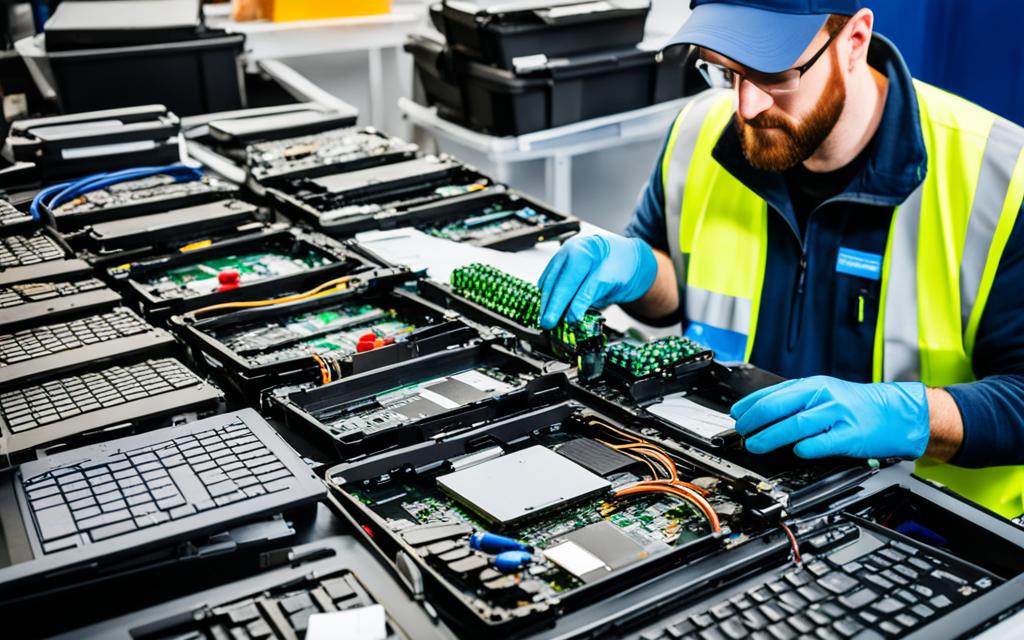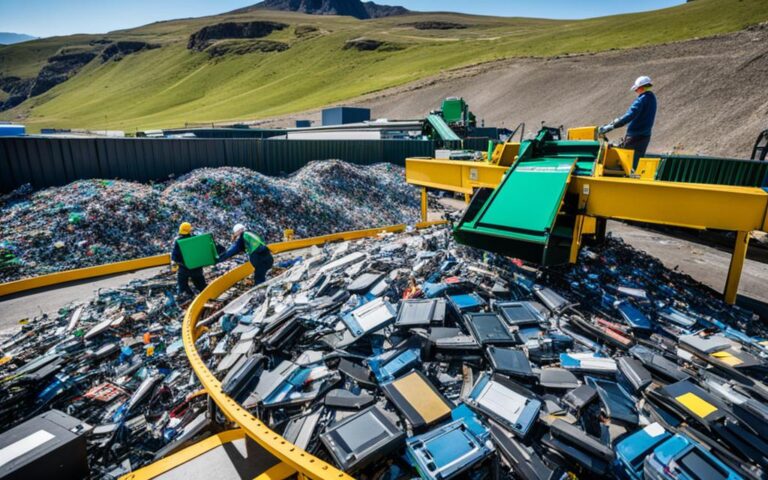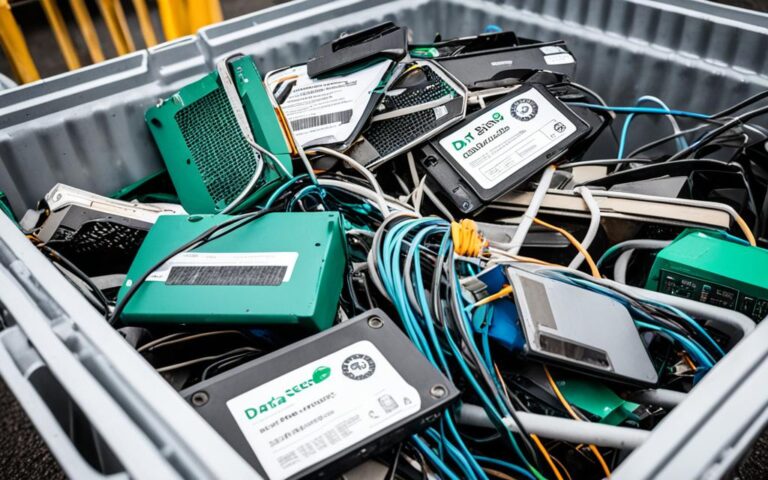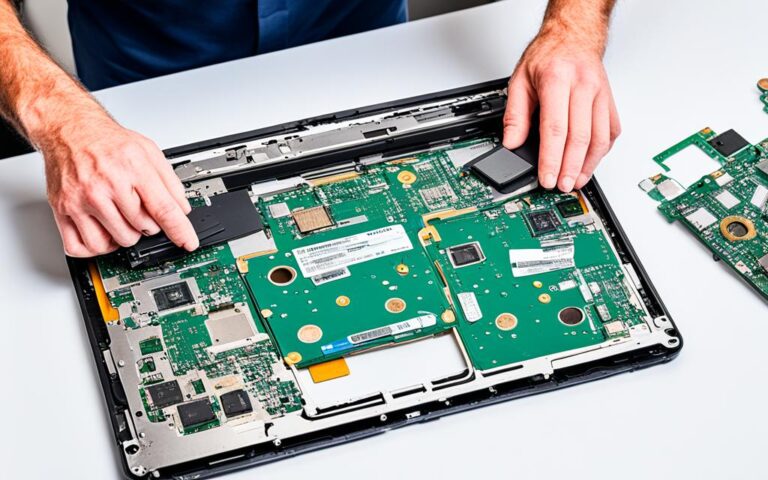How to Ensure Data Security When Recycling Laptops
When it comes to recycling our old laptops, we often focus on the environmental benefits of reducing electronic waste. However, it’s important to remember that data security should also be a top priority. Protecting sensitive information from falling into the wrong hands is crucial to prevent unauthorized access, identity theft, financial loss, litigations, legal penalties, and even blackmail or extortion.
But how can we ensure data security during the laptop recycling process? Well, the first step is to identify the types of data that need protection. Personally Identifiable Information (PII), protected health information, business files, and customer data are just a few examples. Once we’ve determined what data needs safeguarding, we can explore various options to keep it secure.
One option is to transfer important data to an external device or back it up to the cloud. This way, you’ll have access to your files even after disposing of the laptop. If you prefer to remove the data entirely, consider removing and destroying the hard disk. However, simply deleting files is not enough, as they can still be recovered by tech-savvy individuals. That’s why overwriting the data with specialized software or degaussing the data through intense magnetic impulses can be effective methods of erasing sensitive information.
Another crucial step in ensuring data security when recycling laptops is to choose the right disposal method. Dumping old laptops in landfills or trash cans is not only harmful to the environment but also puts your data at risk. Instead, opt for certified laptop recycling services that specialize in electronic waste management and data destruction. These professionals have the expertise to securely erase your data and handle the recycling process responsibly.
By prioritizing data security during laptop recycling, we can not only protect ourselves from potential harm but also contribute to a more sustainable future. So, the next time you recycle your old laptop, remember to take the necessary steps to safeguard your sensitive information and participate in responsible recycling practices.
Why is Data Security Important During Laptop Recycling?
Safeguarding data is crucial during the process of recycling old laptops to mitigate the risks of cybersecurity. Failure to protect data can lead to serious consequences such as unauthorized access, identity theft, financial loss, litigations, legal penalties, and even blackmail. The importance of data protection lies in preventing sensitive information from falling into the wrong hands, where it can be exploited for fraudulent activities.
Compliance with laws and regulations, such as the General Data Protection Regulation (GDPR), is essential for businesses to avoid legal repercussions associated with data breaches. It is imperative to exercise caution when disposing of old laptops to avoid potential harm caused by the misuse of confidential data.
“Data protection is not only a legal requirement but also a moral responsibility. Failing to secure data during laptop recycling puts individuals and businesses at risk of severe financial and reputational damage.”
As technology continues to advance, cybersecurity risks are constantly evolving. Cybercriminals are becoming increasingly sophisticated in their techniques, making it even more important to prioritize data security during every stage of laptop recycling.
Cybersecurity Risks During Laptop Recycling
- Unauthorized access: Without proper data protection measures, unauthorized individuals may gain access to confidential information stored on recycled laptops.
- Identity theft: Unsecured data can be exploited by cybercriminals, leading to identity theft and the potential misuse of personal or financial information.
- Financial loss: Inadequate data security increases the risk of financial loss due to fraudulent activities, including unauthorized transactions and unauthorized use of payment details.
- Litigations and legal penalties: Organizations that fail to protect sensitive data may face legal consequences, including lawsuits and regulatory penalties.
- Blackmail: Cybercriminals may use stolen data as leverage for blackmail or extortion, demanding financial compensation or other forms of coercion.
To ensure data security during laptop recycling, individuals and businesses must take proactive measures to safeguard sensitive information and prevent potential harm. This includes implementing secure data destruction methods and utilizing certified laptop recycling services that prioritize data protection.
Data Protection Best Practices
Here are some recommended best practices to protect data during the disposal of old laptops:
- Transfer valuable data to an external device or back up to the cloud before recycling.
- Permanently delete data by overwriting it with software. Simply deleting files is not sufficient as they can still be recovered.
- Physically destroy the hard disk to ensure it cannot be accessed or used by anyone in the future.
- Degauss data from magnetic storage devices using intense magnetic impulses to erase the data completely.
- Engage certified laptop recyclers who offer data destruction services to ensure secure and proper disposal of old laptops.
By following these best practices, individuals and businesses can minimize the risks associated with data breaches and protect sensitive information from unauthorized access, identity theft, financial loss, litigations, legal penalties, and potential blackmail.
The Importance of Responsible Laptop Recycling
Responsible laptop recycling involves not only protecting data but also managing electronic waste in an environmentally friendly manner. Rather than dumping old laptops in landfills or trash cans, they should be recycled through certified laptop recycling services.
By engaging these services, individuals and businesses contribute to sustainable practices and ensure that electronic waste is properly handled and recycled, reducing the environmental impact. Certified laptop recyclers have the expertise to securely destroy data while responsibly managing the recycling process.
Remember, prioritizing data security during laptop recycling is not only essential for protecting sensitive information but also for complying with data protection laws, avoiding financial losses, legal penalties, and potential damage to reputation. By taking proactive steps to safeguard data, individuals and businesses can foster a secure digital environment.
Types of Data That Need to Be Protected
Different types of data need to be protected during laptop recycling. For businesses, this may include Personally Identifiable Information (PII), including names, phone numbers, emails, and postal addresses of customers and employees, as well as any sensitive information related to the business itself. In addition, protected health information must be safeguarded to comply with data security regulations in healthcare industries. Business files containing confidential information, such as financial reports, legal documents, and trade secrets, should also be protected from unauthorized access. Payment details, including credit card numbers and bank account information, are highly valuable and should be handled with utmost care. Finally, customer data, which includes preferences, purchase histories, and personal preferences, should be protected to maintain trust and privacy.
On personal devices, individuals should consider protecting personal data such as family pictures, sentimental emails, passwords, location information, and bank account details. Academic or professional files that may contain confidential information should also be safeguarded, as they may have implications on future endeavors.
| Data Type | Examples |
|---|---|
| Personally Identifiable Information (PII) | Names, phone numbers, emails, postal addresses |
| Protected Health Information | Medical records, patient diagnoses, treatment plans |
| Business Files | Financial reports, legal documents, trade secrets |
| Payment Details | Credit card numbers, bank account information |
| Customer Data | Preferences, purchase histories, personal information |
Recognizing the types of data that need protection is crucial in ensuring that all relevant information is secured during the disposal of old laptops. By being aware of the sensitive data that exists and taking appropriate measures to protect it, individuals and businesses can minimize the risk of data breaches and maintain confidentiality.
How to Protect Data During the Disposal of Old Laptops
When it comes to disposing of old laptops, it is crucial to prioritize data protection to safeguard sensitive information from unauthorized access. Various methods can be employed to ensure that data is securely erased, preventing any potential risks of data breaches or malicious activities. Here are some effective strategies:
1. Overwriting Data:
One reliable method is to overwrite the data with software. By replacing the deleted data with new sets of data, the original information becomes irrecoverable. This ensures that even with advanced recovery techniques, tech-savvy individuals cannot retrieve any sensitive data.
2. Destroying the Hard Disk:
Merely deleting files from the hard disk is not sufficient to protect data. Physically destroying the hard disk ensures that it cannot be used or accessed in the future. It eliminates the possibility of anyone recovering the data. This method provides a straightforward and foolproof way to safeguard information.
3. Degaussing Data:
Degaussing is an effective technique for wiping data clean from magnetic storage tapes. Intense magnetic impulses are used to permanently erase the data. This method is especially useful when handling older laptops with magnetic storage media and ensures that the information is completely eradicated in a secure manner.
4. Data Destruction Services:
Another reliable approach is to utilize data destruction services provided by certified laptop recyclers. These services are specifically designed to handle the secure destruction of data, ensuring that it cannot be retrieved by any third party. By engaging professionals who specialize in data destruction, you can have peace of mind knowing that your sensitive information is fully protected.
Implementing these data protection methods provides assurance that your confidential information is safe during the disposal of old laptops. By prioritizing data security, you can effectively mitigate the risks of data breaches and unauthorized access.
| Methods | Effectiveness | Reliability | Cost |
|---|---|---|---|
| Overwriting Data | High | Dependent on software | Low |
| Destroying the Hard Disk | Extremely High | High | Varies (DIY or professional services) |
| Degaussing Data | High | High | Varies (DIY or professional services) |
| Data Destruction Services | High | High | Varies (professional services) |
Conclusion
Prioritising data security during laptop recycling is critical for safeguarding sensitive information. By taking proactive measures to protect data and prevent unauthorised access, individuals and businesses can prevent risks such as fraud, identity theft, financial loss, legal issues, and litigation. To ensure data protection, it is advisable to transfer valuable data to an external device, back it up to the cloud, or remove the hard disk before disposing of the laptop.
Additional methods such as overwriting data, physically destroying the hard disk, degaussing the data, and utilising certified data destruction services can provide extra layers of security during the disposal process. These measures ensure that information cannot be retrieved by anyone, even those with expertise in data recovery. To responsibly dispose of old laptops, engaging the services of certified laptop recyclers is highly recommended. They possess the expertise to handle electronic waste and securely destroy data, guaranteeing both e-waste data security and environmental sustainability.
By adhering to these guidelines, individuals and businesses can confidently protect data while actively participating in sustainable laptop recycling practices. Prioritising data security not only minimises the risks associated with confidential information but also supports the responsible management of e-waste, contributing to a cleaner and more secure digital landscape.
FAQ
How can I ensure data security when recycling laptops?
To ensure data security when recycling laptops, it is important to prioritize the protection of sensitive information. This can be done by transferring data to an external device, backing up to the cloud, or removing the hard disk. Additionally, methods such as overwriting data with software, physically destroying the hard disk, degaussing data, and utilizing certified data destruction services can further protect information during the disposal of old laptops.
Why is data security important during laptop recycling?
Data security is crucial during laptop recycling to mitigate the risks of cybersecurity. Failing to protect data can result in unauthorized access, identity theft, financial loss, litigations, legal penalties, and potential blackmail or extortion. Properly safeguarding data prevents sensitive information from falling into the wrong hands and being used for fraudulent activities. Compliance with laws such as the General Data Protection Regulation (GDPR) is also essential for businesses to avoid legal consequences related to data breaches.
What types of data need to be protected during laptop recycling?
Various types of data need to be protected during laptop recycling. For businesses, this may include Personally Identifiable Information (PII) about customers, employees, and the business itself, protected health information, business files containing confidential information, payment details, and customer data such as names, phone numbers, emails, and postal addresses. On personal devices, individuals may want to safeguard family pictures, PII like emails, passwords, location information, and bank account details, as well as academic or professional files that may be relevant in the future. Recognizing the types of data that need protection is crucial when securing information during the disposal of old laptops.
How can I protect data during the disposal of old laptops?
There are several methods that can be employed to protect data during the disposal of old laptops. Overwriting data with software is an effective way to replace deleted data with new sets of data, making the overwritten data irrecoverable. Physically destroying the hard disk ensures that it cannot be used or accessed in the future, as merely deleting files is not enough to prevent information from being retrieved by tech-savvy individuals. Degaussing data involves wiping data clean from magnetic storage tapes through intense magnetic impulses, permanently erasing the data. Utilizing data destruction services provided by certified laptop recyclers can ensure that data is safely destroyed and cannot be retrieved by any third party, regardless of their expertise. These methods provide peace of mind when disposing of old laptops, knowing that sensitive information is fully protected.
Why should I prioritize data security during laptop recycling?
It is crucial to prioritize data security during laptop recycling to protect sensitive information. Failing to do so can result in unauthorized access, identity theft, financial loss, litigations, and legal penalties. To ensure data security, it is recommended to transfer valuable data to an external device, back up to the cloud, or remove the hard disk before disposal. Methods such as overwriting data, physically destroying the hard disk, degaussing data, and utilizing certified data destruction services can further protect information during the disposal of old laptops. Engaging the services of certified laptop recyclers is advised to properly handle electronic waste and securely destroy data, ensuring responsible disposal and data security.















